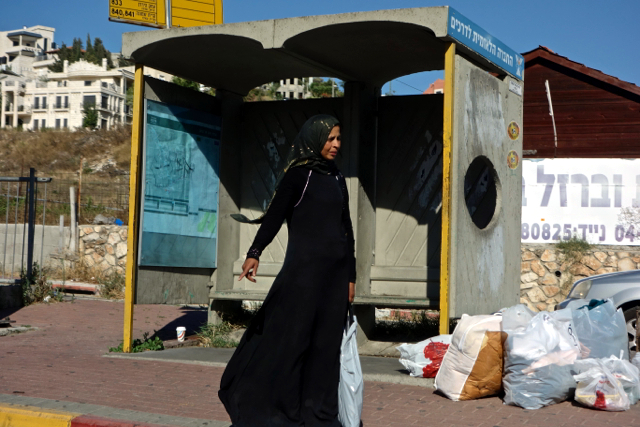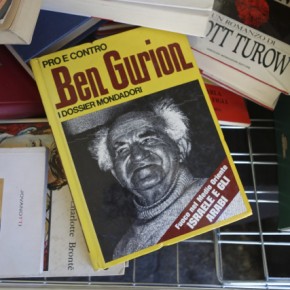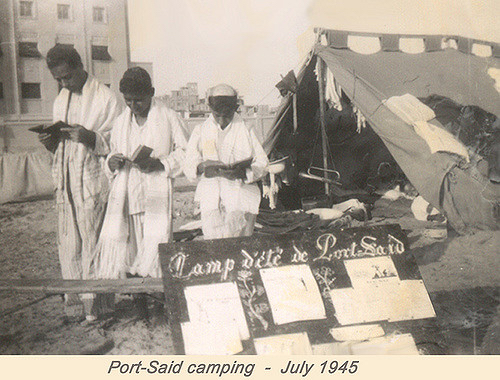“If you think I’m a racist, then Israel is a racist state.” These were the words of the embattled mayor of the Israeli, predominantly Jewish, town of Upper Nazareth, or Natzrat Ilit, in Hebrew. The mayor, Shimon Gafsou (wrongly translated as Gapso) is running for re-election on an anti-Arab platform, and his words bear a very close examination.
Gafsou’s campaign has certainly been bold, and it needs to be—his tenure as mayor, which started in 2009, has been marked by allegations of corruption, including Gafsou’s arrest in 2010. He was rebuked this past April by the State Comptroller for trying to fire a city official who was exposing corruption in Nazareth Ilit. So, as Gafsou campaigns for re-election, it is understandable that he is trying to deflect attention in another direction.
Overt racism is not new for Gafsou. In 2010, he assumed the role of The Grinch by forbidding the city’s Arab citizens from erecting a Christmas tree in the town center. The Arab citizens said that the tree would symbolize the town’s unity, where Jews, Christians and Muslims live together, but Gafsou said the act was “provocative” in a “Jewish city.”
The current row began when Gafsou’s campaign decided to highlight his anti-Arab stance, with posters reading: “Upper Nazareth will be Jewish forever; no more shutting our eyes, no more grabbing on to the law allowing every citizen to live where he wants. This is the time to defend our home.” And another: “I will not allow the city’s Jewish character to be changed. I will block the establishment of an Arab school and will build neighborhoods for Jewish residents … Upper Nazareth is a Jewish city!”
The Attorney General is now looking into complaints of racist incitement, but Gafsou is unbowed. Placing an op-ed in Israel’s most liberal daily, Ha’aretz, the mayor laid out his case quite plainly. No doubt, Israelis across the spectrum were outraged. But, while some are genuinely offended, others must be uncomfortable with how close to the mark some of his points are. Still others, all too many of them, are either only upset that the veneer has been taken off of their own real views, which they know to be politically difficult, especially in international fora; and far more than many of us would care to admit are fully supportive of Gafsou’s views.
Gafsou’s case is that his exclusion of Arabs is very much in keeping with the Israeli tradition. He naturally cites the Torah, and particularly God’s covenant with Abraham and Joshua’s horrendously bloody conquest of Canaan. He quickly moves to Theodor Herzl and points out that he wrote “’The Jewish State,’ not ‘The State of All Its Citizens.’”
Gafsou unwittingly shows us how anachronistic his thinking is. Herzl, who died in 1904, saw only that despite the Enlightenment, anti-Semitism remained strong in the Western world. Indeed, it would culminate with the rise of Fascism in the country where Jews had assimilated more completely than anywhere else in Europe. But Herzl could not envision the post-Holocaust world. His belief that Jews could never comfortably and fully assimilate into other countries has been proven wrong in much of the West. It would be patently false to say that anti-Semitism has been relegated to the dustbin of history in the United States, Canada, England, Australia and other places. Indeed, it has recently been resurgent in France, Germany and other European countries. But it is equally false to say that Jews have not assimilated in those countries. This has happened not because of Israel, but despite it. Israel was and remains predicated on the “in-gathering of the exiles,” yet the Diaspora grows faster than the Israeli Jewish population.

Perhaps most telling is this piece from Gafsou’s rant: “Even our ‘racist’ national anthem ignores the existence of the Arab minority — in other words, the people Ben-Gurion did not manage to expel in the 1948 war. If not for all that ‘racism,’ it’s doubtful we could live here, and doubtful that we could live at all.” Gafsou quickly and neatly lays to rest the notion that the Palestinians left because they thought the Jews were to be “driven into the sea,” or simply because they didn’t want to live with Jews. The historical record of these events has been firmly established as few events are, largely because the Haganah’s (the precursor to the modern Israeli army) records are so clear on the matter. Certainly many Palestinians fled, as civilians are wont to do in time of war, but a great many were intentionally driven out, either by operations intended to frighten them away or at gunpoint.
None of that is in serious dispute except by propagandists who work very hard (all too often successfully) to create a fiction about Israel’s birth by writing a story that is clearly contradicted by Israeli records. Yet, there was also a larger story at that time, occurring as it did in the shadow of the Holocaust, the wake of Britain closing Palestine just as that genocide was starting up in earnest and the shame of the United States and other countries refusing entry to refugees fleeing Nazi extermination. That may not excuse the massive dispossession, the expulsions, years of martial law for those who remained or ensuing occupation, but it does help explain it and give it context. Gafsou removes all of that and leaves only one, all too real and very significant aspect of those actions: Zionist racism.
And that is why we need Shimon Gafsou. There are many simplistic explanations for Israel’s behavior, for its history of dispossession, its 46 years of denying basic rights to millions of Palestinians, its human rights abuses. Some say that it is colonialism, security concerns, a response to terrorism, Israel’s position as a US client state in a strategically important region. And some say it’s just plain old racism. All of these are parts of the picture, as was the refusal to support those relatively few early Zionist immigrants who did try to work with Palestinians, poor strategy on the part of Arab leaders, British machinations during the Mandate, collaboration and conspiracy among those leaders who were speaking in the name of Palestinians (without actually speaking for them,) and many other factors. All of them need to be understood.

But Israel’s insistence that it must be given the role of the downtrodden and persecuted, a role easily assumed in the context of Jewish history, belies its position as the regional hegemon with an overwhelming advantage in every way over the dispossessed, stateless and currently rudderless Palestinians. Shimon Gafsou’s view is not at all uncommon in Israel and, especially, among so-called “pro-Israel” forces in the United States. It is fundamental to the ongoing oppression of Palestinians, in Israel and in the territories it occupies.
It’s worth noting that Gafsou’s argument is inherently anti-Semitic. He argues that Israel cannot exist without treating non-Jews badly. He ignores the context in which Herzl lived, or in which Ben-Gurion carried out the acts he cites. Herzl, who saw the Jews as a fundamentally abnormal people who, even in the post-Enlightenment world could not fit in to Western society. He and Ben-Gurion saw the Jews of the Diaspora as weak. Both also believed that “a New Jew” must be created through Zionism.
There was some truth to that. Zionism did provide a path for Jews to strengthen themselves and to be able to put up a fight against ant-Semitism. But, after the Holocaust, Jewry also found other ways to accomplish the same thing, something Herzl and Ben-Gurion did not believe was possible. Take the advancement of civil rights and racial equality in the US, during the postwar period, as but one example.
Today, Jews, collectively and individually, work from a position of strength, throughout the West. We have many allies who will not tolerate anti-Semitism, but we can also fight it ourselves in a way we never could before. And today there is an Israel, and it is a Jewish state. Ultimately, though, our strength cannot endure our own acts of injustice. That’s where Gafsou has it backwards.
The past has happened. It cannot be reversed, nor can it be forgotten. Jews have suffered, and Israel has caused great suffering to the Palestinians. None of that can go away and no penance by anyone can truly make it better. But actions taken in the context of war and conflict – actions which even under those circumstances may not be excusable – cannot be permitted to be mirrored in other times.
Gafsou would claim that the ideas and actions of Herzl, Ben-Gurion and even the biblical Joshua create a blueprint for how a powerful government should act. In fact, it is the opposite. The Bible commands that “if a stranger dwells in your land, you shall do him no wrong,” {Leviticus 19:33] and that, if taken along with God’s commands to harshly conquer the land demonstrates clearly the difference between behavior in war and how you act as a government. But in modern times, we have moved beyond the biblical tribalism. We expect government to take care of the weakest among their citizens. Most governments fall pretty short of that bar, but few Western governments do as badly in this regard as Israel does.
And that is why we need Gafsou. He shines the light on Israel’s abuse of Palestinians, and how it is rooted in a Zionist ideology that is badly outdated. Zionism—the need to for a national Jewish consciousness—need not be abandoned in order to transcend views like those of Gafsou, his friend and ally Avigdor Lieberman or the newest incarnation of these racist views, Naftali Bennett. But it certainly needs to be rethought, and recast away from its Herzlian roots as a particularistic and discriminatory nationalism. Other Zionist thinkers, such as Ahad Ha’am, Judah Magnes and Martin Buber, have blazed that trail, which so few have followed.
A post-Zionist future is also possible. A former teacher of mine, who described herself as a “Palestinian Jew” because she was born there before Israel was created, opined that Zionism was the drive to create a Jewish state, and that meant it was obsolete by 1949. She is not alone in that view.
As I have proposed elsewhere, a constitution that makes Israel both a state of all its citizens and guarantees it as a cultural homeland for Jews and refuge for those fleeing anti-Semitism, would mean an Israel which was no longer racist, but still was a place Jews could be at home. There are other options. But we will not reach any of them as long as racism is hidden under veils of legitimacy. That, more than any other reason, is why we need those who will strip that veil away and let us get to the heart of the racism matter. That is why we need Shimon Gafsou.
Photographs courtesy of Joel Schalit





